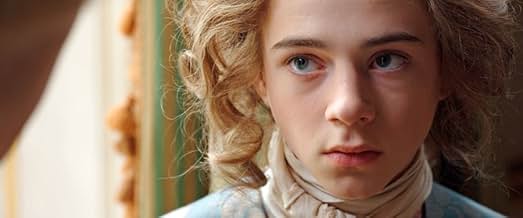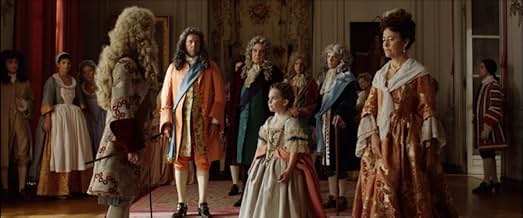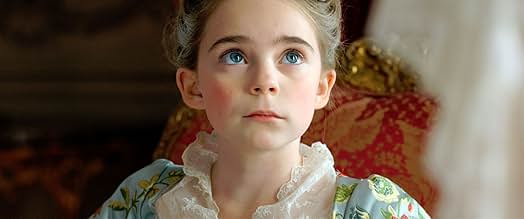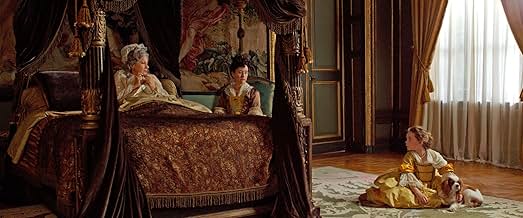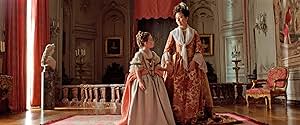NOTE IMDb
6,7/10
1,4 k
MA NOTE
Philippe d'Orléans, Régent de France, marie donc sa fille, à l'héritier du trône d'Espagne, et Louis XV doit épouser l'Infante d'Espagne. Mais l'entrée précipitée dans la cour des Grands de ... Tout lirePhilippe d'Orléans, Régent de France, marie donc sa fille, à l'héritier du trône d'Espagne, et Louis XV doit épouser l'Infante d'Espagne. Mais l'entrée précipitée dans la cour des Grands de ces jeunes princesses aura raison de leur insouciance.Philippe d'Orléans, Régent de France, marie donc sa fille, à l'héritier du trône d'Espagne, et Louis XV doit épouser l'Infante d'Espagne. Mais l'entrée précipitée dans la cour des Grands de ces jeunes princesses aura raison de leur insouciance.
- Réalisation
- Scénario
- Casting principal
- Récompenses
- 3 victoires et 1 nomination au total
Avis à la une
This movie takes us to witness the weird intricacies of royal marriages of old. This story (based on a book I haven't read) is a great idea and could make a great movie, but I was a bit disappointed by the result.
The movie lacks flair and I feel it might mostly be an editing and direction problem. Scenes just follow one another like it's an animated picture book. It's never really clear what the movie wants to say to us besides "look, this story happened". It is a good story, but not enough to make it a great movie.
The tone isn't very consistent. A lot of the movie plays as a comedy, as it shows the ridiculousness of the social rules of the time. At the beginning, I wasn't sure this comedic tone was intentional. Now, I do think it was, but, at the same time, the rest of the movie has a such a somber tone... instead of feeling like a dramedy, it rather looks like the director wasn't sure of what he wanted.
The actors are all great. I especially liked Igor van Dessel as Louis XV and Juliane Lepoureau as the Infanta. Thomas Mustin gloriously overacts as the Duke of Condé. I couldn't say I didn't like it, but it's a jarring contrast to the seriousness of all the other actors. Similarly, Anamaria Vartolomei plays Louise-Elizabeth as a very modern teenager, while everyone around her adopts more historical manners (that contrast may have been intentional, but I didn't like it). So, again, it looks like the director wasn't sure of what he wanted from his actors.
All in all, if you're interested in movies about the "Ancien Régime", like I am, you'll probably find a lot to enjoy in this movie. But you won't find a masterpiece. The costumes and the sets are beautiful and make for a good immersion into that time. I couldn't speak about the historical accuracy: I only noticed that they aged up the four children by a few years. It definitely looked historically accurate, but viewed through the lens of our modern age, where such marriage practices look at best absurd.
6.5/10.
The movie lacks flair and I feel it might mostly be an editing and direction problem. Scenes just follow one another like it's an animated picture book. It's never really clear what the movie wants to say to us besides "look, this story happened". It is a good story, but not enough to make it a great movie.
The tone isn't very consistent. A lot of the movie plays as a comedy, as it shows the ridiculousness of the social rules of the time. At the beginning, I wasn't sure this comedic tone was intentional. Now, I do think it was, but, at the same time, the rest of the movie has a such a somber tone... instead of feeling like a dramedy, it rather looks like the director wasn't sure of what he wanted.
The actors are all great. I especially liked Igor van Dessel as Louis XV and Juliane Lepoureau as the Infanta. Thomas Mustin gloriously overacts as the Duke of Condé. I couldn't say I didn't like it, but it's a jarring contrast to the seriousness of all the other actors. Similarly, Anamaria Vartolomei plays Louise-Elizabeth as a very modern teenager, while everyone around her adopts more historical manners (that contrast may have been intentional, but I didn't like it). So, again, it looks like the director wasn't sure of what he wanted from his actors.
All in all, if you're interested in movies about the "Ancien Régime", like I am, you'll probably find a lot to enjoy in this movie. But you won't find a masterpiece. The costumes and the sets are beautiful and make for a good immersion into that time. I couldn't speak about the historical accuracy: I only noticed that they aged up the four children by a few years. It definitely looked historically accurate, but viewed through the lens of our modern age, where such marriage practices look at best absurd.
6.5/10.
This film plunge into the slow moving parts of old. How the life of kings was not all glam, and inbreeding was encouraged. Also impredictable things could be.
If you want to immerse yourself in the atmosphere of France of the XVIII century, at a time when the kings were just boys-then this is the movie for you! Do not really wait for an exciting plot - this picture leads the viewer with a stingy narrative thread.
However, from the point of view of historical interest, viewing will definitely not become boring. Of course, I would like to add more drama and emotions here, as for example, Russian filmmakers did in the historical series of the 2000s "Secrets of Palace Coups", where, by the way, the beginning of the story is also conducted from the time of the XIII century. But the French-Belgian brainchild, filmed by the way based on the novel of the same name, has its own twist. Therefore, in one of the quiet evenings, I recommend to get acquainted with this picture and breathe in the atmosphere of a magnificent court and secret conspiracies, without which the existence of any kingdom could not do. Yes, by the way, what I would especially like to highlight is the play of young actors. They, in my opinion, played such significant roles for history in a magnificent and masterful way!
However, from the point of view of historical interest, viewing will definitely not become boring. Of course, I would like to add more drama and emotions here, as for example, Russian filmmakers did in the historical series of the 2000s "Secrets of Palace Coups", where, by the way, the beginning of the story is also conducted from the time of the XIII century. But the French-Belgian brainchild, filmed by the way based on the novel of the same name, has its own twist. Therefore, in one of the quiet evenings, I recommend to get acquainted with this picture and breathe in the atmosphere of a magnificent court and secret conspiracies, without which the existence of any kingdom could not do. Yes, by the way, what I would especially like to highlight is the play of young actors. They, in my opinion, played such significant roles for history in a magnificent and masterful way!
This movie focuses on, what I expect, is a little known episode in French history. I didn't know about it anyway. Like most period pieces, this one takes a few liberties with real events and rearranges the timeline slightly in order to make a more compelling story. It is an interesting story too and the movie held my attention all the way through. That being said, however; it must also be said that there is not much in the way of excitement in the story and you won't find yourself getting emotionally involved with the characters. The setting, costumes and other attention to detail are top-notch. The acting is excellent too. Special kudos to the two young actors who play the Spanish Infanta and Louis XV respectively. Both are excellent and I hope we see much more of them in the future. All in all, this movie is well worth watching. It just won't be one that sticks in your memory long after the closing credits roll.
France, early 18th century. The legendary Sun-king is no more. His great-grandson and heir Louis XV is still a minor. Philippe d'Orleans, nephew of the deceased ruler, acts as regent. Eager to cement a reliable peace with Philippe d'Anjou, king of Spain, the regent proposes two marriages between the royal families.
Naturally, that initiative must be understood according to the political peculiarities of the time. Philippe d'Anjou ascended to the throne of Spain championed by his grandfather Louis XIV. After a long and bloody war against the Austrian claimant, Philippe managed to secure the Spanish crown, but had to renounce his rights to French succession.
The regent feared that d'Anjou would now take advantage of the monarch transition in France and disregard the renouncement. In this sense, marriage came off as a quite convenient diplomacy tool.
Louis XV was married to Anna Maria Victoria, Philippe d'Anjou's infant daughter. The regent's daughter, Louise Élisabeth, coupled with Louis of Spain, Philippe's eldest son. The regent's choice for Louis XV was not unopposed, though. The perfidious Prince de Condé, another grandson of the Sun-king, wanted an older match for the boy, so that an heir could be produced quickly. For reasons I won't spoil here, the unions don't flow as smooth as idealized.
So, given that introduction, let's move to the movie itself:
-"L'échange des princesses" is monotonous. It has too much of a contemplative nature and very little motion -I couldn't identify the climax at all. Were this movie supposed to be a philosophical or experimental work, that wouldn't be an issue. But it's as formulaic as most historical dramas.
-The sequence of events is cartoonish and superficial. We viewers are limited to the uninteresting daily life of royal people and their repetitive, silly feelings. It seems like the director just didn't care about building a solid grid of events. He decided the synopsis should be more than a prelude to the movie; it should be the movie itself! A few additions were made, but nothing relevant enough to keep the viewer awakened. We know the end from the middle and the director puts no effort in surprising us. Of course, movies based on history are always prone to that; but here the issue is just blatant.
-I didn't spot a single miserable soul on screen. No beggars, no smallpox victims lying on roads, no hunger-ridden peasants, no despicable living places -you know, all stuff you expect to see in a minimally critic movie on pre-revolutionary France. One might argue: "Well, this movie is supposed to be about the royal world; you can't blame the creators for not going political". But they went political. With varying degrees of subtlety, the director sought to expose the subjugation of women and LGBT individuals, for which I don't criticize him -au contraire. He made a very good job in that sense. Women being treated solely as children-machines, for example, is a chauvinist issue quite evident in "L'échange des princesses". But I find it rather strange that the inequality of classes, so terrific in the framed period, was just forgotten by the creators.
-Costumes were great: varied and immersive.
Overall, this movie is watchable. It's a nice pick to watch with family. But it's not good, unfortunately.
Naturally, that initiative must be understood according to the political peculiarities of the time. Philippe d'Anjou ascended to the throne of Spain championed by his grandfather Louis XIV. After a long and bloody war against the Austrian claimant, Philippe managed to secure the Spanish crown, but had to renounce his rights to French succession.
The regent feared that d'Anjou would now take advantage of the monarch transition in France and disregard the renouncement. In this sense, marriage came off as a quite convenient diplomacy tool.
Louis XV was married to Anna Maria Victoria, Philippe d'Anjou's infant daughter. The regent's daughter, Louise Élisabeth, coupled with Louis of Spain, Philippe's eldest son. The regent's choice for Louis XV was not unopposed, though. The perfidious Prince de Condé, another grandson of the Sun-king, wanted an older match for the boy, so that an heir could be produced quickly. For reasons I won't spoil here, the unions don't flow as smooth as idealized.
So, given that introduction, let's move to the movie itself:
-"L'échange des princesses" is monotonous. It has too much of a contemplative nature and very little motion -I couldn't identify the climax at all. Were this movie supposed to be a philosophical or experimental work, that wouldn't be an issue. But it's as formulaic as most historical dramas.
-The sequence of events is cartoonish and superficial. We viewers are limited to the uninteresting daily life of royal people and their repetitive, silly feelings. It seems like the director just didn't care about building a solid grid of events. He decided the synopsis should be more than a prelude to the movie; it should be the movie itself! A few additions were made, but nothing relevant enough to keep the viewer awakened. We know the end from the middle and the director puts no effort in surprising us. Of course, movies based on history are always prone to that; but here the issue is just blatant.
-I didn't spot a single miserable soul on screen. No beggars, no smallpox victims lying on roads, no hunger-ridden peasants, no despicable living places -you know, all stuff you expect to see in a minimally critic movie on pre-revolutionary France. One might argue: "Well, this movie is supposed to be about the royal world; you can't blame the creators for not going political". But they went political. With varying degrees of subtlety, the director sought to expose the subjugation of women and LGBT individuals, for which I don't criticize him -au contraire. He made a very good job in that sense. Women being treated solely as children-machines, for example, is a chauvinist issue quite evident in "L'échange des princesses". But I find it rather strange that the inequality of classes, so terrific in the framed period, was just forgotten by the creators.
-Costumes were great: varied and immersive.
Overall, this movie is watchable. It's a nice pick to watch with family. But it's not good, unfortunately.
Le saviez-vous
- AnecdotesOn 3 October 2016, Marc Dugain and the film crew started shooting in Belgium, specifically in the Walloon Region, including the castle of La Hulpe in the province of Walloon Brabant and Beloeil Castle in the province of Hainaut. , as well as the Flemish Region, including the castle of Gaasbeek in Pajottenland, to unfold between the Palace of Versailles and Spain.
Meilleurs choix
Connectez-vous pour évaluer et suivre la liste de favoris afin de recevoir des recommandations personnalisées
- How long is The Royal Exchange?Alimenté par Alexa
Détails
- Date de sortie
- Pays d’origine
- Sites officiels
- Langue
- Aussi connu sous le nom de
- Los hijos del rey
- Lieux de tournage
- Gaasbeek Castle, Lennik, Belgique(Spanish castle exteriors)
- Sociétés de production
- Voir plus de crédits d'entreprise sur IMDbPro
Box-office
- Budget
- 9 449 000 € (estimé)
- Montant brut mondial
- 3 131 171 $US
- Durée1 heure 40 minutes
- Couleur
- Rapport de forme
- 2.39 : 1
Contribuer à cette page
Suggérer une modification ou ajouter du contenu manquant

Lacune principale
By what name was L'Échange des princesses (2017) officially released in India in English?
Répondre
![Regarder Bande-annonce [OV]](https://m.media-amazon.com/images/M/MV5BMDE3ZGNjZGQtYjUwNC00ZjI0LTgxZmItMmVmOWUwNzEwYzIxXkEyXkFqcGdeQXRodW1ibmFpbC1pbml0aWFsaXplcg@@._V1_QL75_UX500_CR0)
